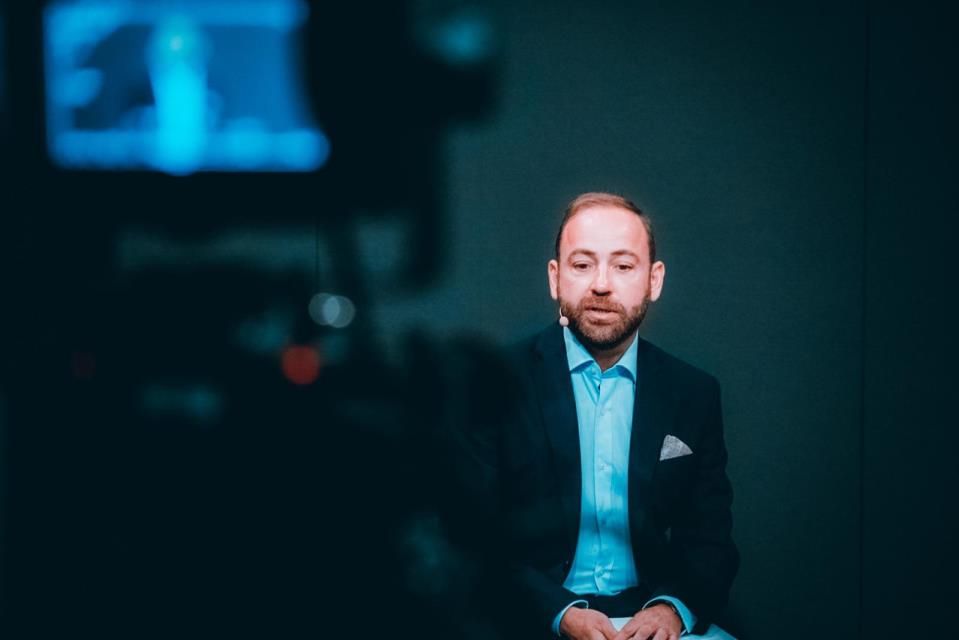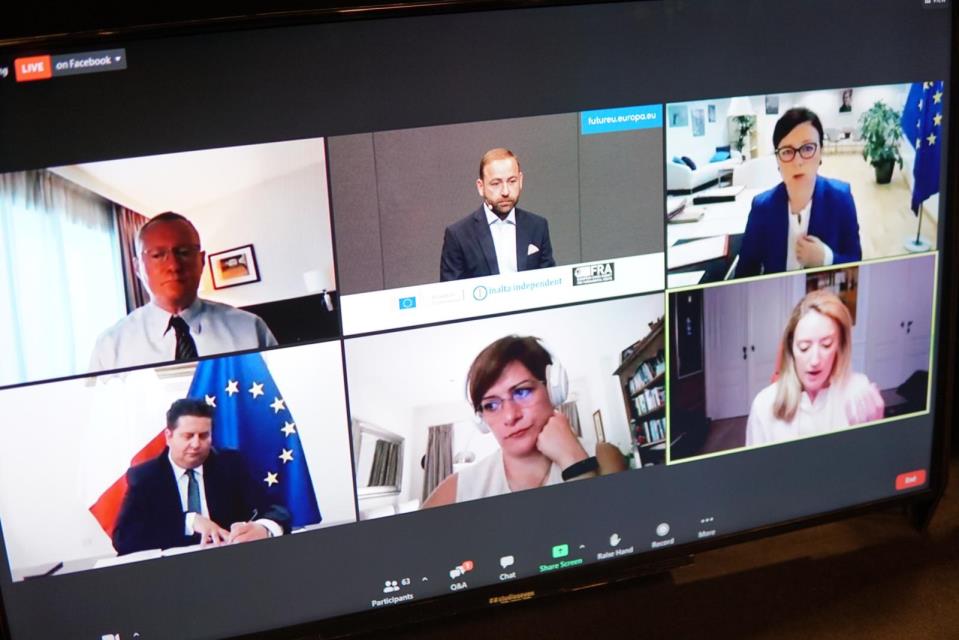A webinar discussing ‘Strengthening Application of the EU Charter of Fundamental Rights: Freedom of Expression and Information,” took place today, with special attention given to Strategic Lawsuits Against Public Participation (SLAPPs).
The event was organised by the European Commission Representation in Malta in collaboration with The Malta Independent.
Speakers included Věra Jourová, Vice President of European Commission for Values and Transparency, Edward Zammit Lewis, Malta’s Minister for Justice, Roberta Metsola, First Vice President at the European Parliament, and Michael O’Flaherty, Director of the EU Agency for Fundamental Rights. A Q&A session with the audience will also form part of the event.
During the webinar, Metsola - who is also one of the rappouters on SLAPP legislation in the EU Parliament - said that binding regulations when it comes to SLAPP suits, which are suits used to silence journalists or activists by using cross-border jurisdictions or existing overly prohibitive court procedures, are in the pipeline for the European Union as a whole.
It was a matter which Zammit Lewis agreed with, saying that a binding framework which ensures that foreign jurisdictions recognise case judgements from other countries is integral to fighting SLAPP suits at an EU-wide level.
Metsola said that models in Canada, Australia, and the United States are being looked at for adaptation to the EU, while further soft measures - such as added training for judges and funds for journalists and activists targeted by SLAPP suits - are also likely to be presented as part of the solution.

10:11: That brings our webinar to a close - thank you for following!
10:09: Asked about where one draws the line between freedom of speech and hate speech, O’Flaherty says that there are limits to freedom of speech: “unrestrained speech can lead to disasters, like we saw in World War 2.”
He said that speech which is uncomfortable is not necessarily hate speech, and said that there is a narrow definition of what hate speech actually constitutes.
Asked by a member of the public whether it was right in terms of free speech that anti-racist activists block any debate with those against migration by labelling people are racists or xenophobes and that people with such beliefs rarely get media coverage, Metsola said that the question seemed to contain an implicit understand that if one is racist, then they can comment as they please.
“I would plead for a distinction between a migration debate, which is very valid, and racism: the respect of the law and of fundamental rights are universal and do not depend on skin colour”, she said.
Finally, asked about support to newsrooms and about her views on politically-owned media houses, Jourova said that the EU’s biggest push must be on transparency of media ownership so that people can understand who is paying the money behind the content, and which interests might be seen in what they read.
On the former point, Jourova said that while newsrooms need support, especially due to the struggles of Covid-19, she was against paying for “editorial gratefulness” to try and influence content.
“We need to support media as a sector heavily hit by Covid-19 – help them survive, digitalise, modernise and be more fit for the 21st century but never try to influence what they are writing. No propaganda through EU funding – something which unfortunately has not been the case of several member states”, she said.
10:03: Zammit Lewis fields a question on a recent protest outside Parliament – which was suppressed by government officials who threw placards away – and about Malta’s whistleblower laws.
On the first point, the Justice Minister answers: “I support freedom of expression in all its forms as long as its compliant with the law.”
On the second, Zammit Lewis says that the government is conscious about the directive to take the current Whistleblower Act to the next level, saying that the government is currently undertaking an exercise to see what needs to be changed in order to be compliant with the spirit of the EU’s directive.
A question on a supposed abortion law being tabled in the EU Parliament this week was replied to by Jourova saying that “abortion does not fall under the competence of the EU”, while Metsola clarified that the “law” mentioned in the question is actually a report and does not impinge on what was signed in Malta’s Treaty of Accession, in that such issues remain of national competence.
09:55: The Question & Answer phase now begins:
Both Zammit Lewis and Metsola are asked about further initiatives on SLAPP suits.
Zammit Lewis speaks about the importance of enforcement of foreign judgements and the need for a binding framework and regulation at an EU-level.
“We are in favour of more SLAPP regulations, but there needs to be an EU framework”, Zammit Lewis says.
Metsola on her part says that a binding measure is an important part of the legislation that will be proposed.
She expands further on soft measures which can also be implemented against SLAPP suits.
These include the training of judges to be able to deal with complicated cases in different jurisdictions and in recognising when a suit is vexatious or otherwise; funds to protect journalists and civil society members when they are facing suits which are clearly targeted at shutting them down.
She said that there are models in countries such as Canada, Australia and the United States which have been specifically created to target law suits outside their jurisdiction, and that these are models which can be followed.

09:43: Michael O’Flaherty is the final speaker to give his opening remarks.
He starts by paying tribute to Malta’s achievements in a number of human rights fields, and to Daphne Caruana Galizia.
He said that besides SLAPP suits there are three other prevalent and which need to be addressed: these being physical attacks on journalists, politically-motivated monopolistic tendencies, and the political takeover of the media in many countries.
“The strategy to give new focus to the charter has the potential to be a game changer”, O’Flaherty said.
He said that an architecture at a national level is needed for the Charter to truly thrive.
“It can only come to life and be a force for change in our societies if we have strong independent courts, free thriving media, protected and respected civil society, effective national human rights institutions”, O’Flaherty said.
He closed off his remarks by quoting Edward deBono, who recently passed away, saying that creativity involves breaking out of established patterns in order to look at different things in different ways, and augured that this can be done.
09:35: Roberta Metsola follows with her address.
“The right to speak, publish, and disagree is one of the most fundamental rights – and the latter is one where governments across the EU have breached to go after journalists who criticise them”, she begins.
Metsola says that there is a “disconnect” between what citizens expect from EU and the tools that the EU has to meet said expectations.
The Article 7 procedure, she said, has proven to be less effective than previously thought.
“Soft measures like scoreboards and annual rule of law reports can be useful, but when they fail to instigate the necessary results it may be time to look at our legislative armoury to react”, she said.
She added that the EU’s democracy protection toolbox has some missing elements.
Metsola is one of the MEPs tasked with reporting to the European Parliament on SLAPP legislation, and she said that her report will call for “binding legislation to safeguard against the threat to our fundamental rights.”
“Looking at the future of the EU does not mean being self-centred: we need a strong EU to speak on the global stage and defend our values. As we saw in Belarus, for instance, we are facing threats that can only be met by Europe speaking in one voice”, she said.

09:24: Edward Zammit Lewis is up next with his opening address. He speaks about the importance of the Charter, saying that it should have legal value when it comes to bilateral treaties, and about the need for awareness so that European citizens actually know their rights as per the Charter.
He said that there is the need to enhance freedom of expression and freedom to inform, and the importance of SLAPPs.
At a national level, Zammit Lewis said, the government has taken various initiatives through the new Media & Defamation Acts such as capping of amounts, that libel suits cannot be made on the same statements in different media avenues, the removal of the right to issue precautionary warrants in such cases and other initiatives to limit multiple law suits in Malta.
With regards to foreign judgements, he says that he has been stressing that there has to be an EU-wide initiative to eliminate these SLAPP suits.
National judges, he said, should act like EU-judges, noting that judges need more training to apply EU law, including the Charter in our legal system.
09:17: Unfortunately, however, even though the structures are solid and progress is clear, charter rights are far from being a reality for all, Jourova said.
She said that more training and education is needed, and that the charter requires training, and needs to be in school curricula to be part of our daily life.
“In 10 years, I would like to see this and see the Charter be used for the improvement of people’s lives”, she added.
EU-funded projects will also need to comply with EU law, in particular the charter, Jourova said as she turned to the recent EU budget.
“As EU institutions we must also be beyond reproach when applying the charter and make sure that the human concerns in a range of issues are at the centre of our work”, Jourova said.
09:14: European Commission Vice President Vera Jourova kicks us off. She explains that the EU Charter is now simply any instrument in EU law: it enshrines fundamental rights which any European should enjoy, and it has led to legislative progress and initiatives in a multitude of fields.
The most recent of those initiatives is a work in progress relating to SLAPP law suits – suits used against the media or individuals which are prohibitively difficult to defend against, because for instance they would be in courts in different countries.
“The inspiration for this in Malta was the assassination of Daphne Caruana Galizia, who was facing several SLAPP suits which was shocking and which requires a solution at a European level”, she says.
09:00: Good morning and welcome to the live commentary for this webinar. The webinar is expected to take around an hour, and will discuss how the EU implement freedom of expression and information laws. A Q&A will follow.
Photography: Giuseppe Attard